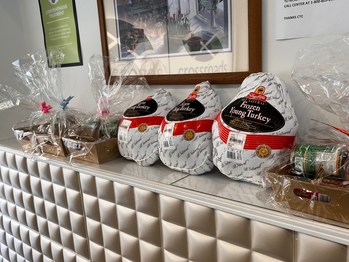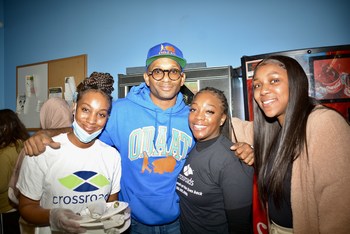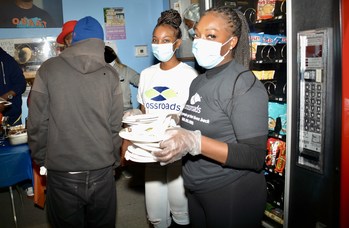
[ad_1]
PHILADELPHIA, Nov. 27, 2022 /PRNewswire/ — On November 21, 22, and 23, 2022, Crossroads Treatment Center’s (CTC/Crossroads) Community Health Program hosted its first-holiday giveaway, consisting of 45 present baskets, which included a 10-pound turkey and an array of conventional “sides” discovered at conventional Thanksgiving dinners. The program was held on the Center’s clinics situated at 504 South Street, 2820 West Girard Avenue, and 2307 North Broad Street. The recipients of the hampers had been chosen group residents and sufferers enrolled in CTC’s Community Health Program.
Pictured are the turkeys and baskets that the CTC Community Health Program’s visitors acquired, once they arrived.
Shown right here, left to proper, had been CTC group well being staff Keith Smith and Kerstan Hiltwine, and Crossroads space supervisor Jessica Pointer.
The Community Health Program was created in Philadelphia, as part of Governor Tom Wolf’s “Centers of Excellence” initiative, in 2016, and is geared toward addressing the state’s rising disaster associated to using opioids and different authorized and unlawful medicine. The governor’s place is that “Centers of Excellence have proved themselves to be a critical part of our efforts to improve treatment for people suffering with opioid use disorders. It is critical that we continue to do everything we can to combat this epidemic and, with these centers, individuals suffering from OUD (opioid use disorders) have access to treatment in their communities for the whole person, instead of just the disease.”
Structured consistent with the University of Pennsylvania’s IMPaCT (Individualized Management for Patient-Centered Targets) mannequin, the Community Health Program identifies how sufferers could also be impacted by the social determinants of well being of their neighborhoods and works to resolve such points. Additionally, researchers from the University of Pennsylvania Health System have partnered with Philadelphia group members and well being system management to develop a dynamic, evidence-based, nationally acknowledged mannequin.
Part of that course of demanded that CTC create Community Health Professionals, comprised of members of its administration workers, charged with participating the corporate’s most susceptible sufferers by aiding them in eliminating obstacles that at the moment stop them from getting the therapy they require and deserve.
As Jessica Pointer, the supervisor for CTC’s program, commented, “The Community Health Professionals canvass our communities, attend meetings and programs, and partner with organizations to connect patients to resources of which they may not be aware. They have a special ability to bring information to people and places where it is needed most. Our program is driven by those “frontline brokers of change.”
Working well beyond the treatment standards, the team is empowered to close previously unaddressed gaps, customizing courses of treatment based on the specific needs and requirements of the individual client. As a result, they are able to refer clients to resources and connective services that ensure that their journey towards recovery will be as free as possible from impediments. This is especially significant when attempting to improve the outcomes for high-risk clients.
Crossroads is committed to helping people to recover from their addictions and to regain control of their lives. In that regard, CTC closed out this week’s holiday celebrations by having staff and managers volunteer to assist at ODAAT’s Reverend Henry T. Wells and Chief Rooney Thanksgiving Day Community Dinner. The dinner is an annual event, now in its 23rd year, and was held at the ODAAT AFCOM Center, located at 2432 W. Lehigh Avenue. Featured at the event were master of ceremonies Evangelist Chip Mitchell, a special performance by Soldiers for Recovery, and a host of civic-minded, socially conscious, supporters and volunteers.
For additional information, please contact A. Bruce Crawley, at 267-243-2500 or [email protected].
SOURCE Crossroads Treatment Centers

[adinserter block=”4″]
[ad_2]
Source link



